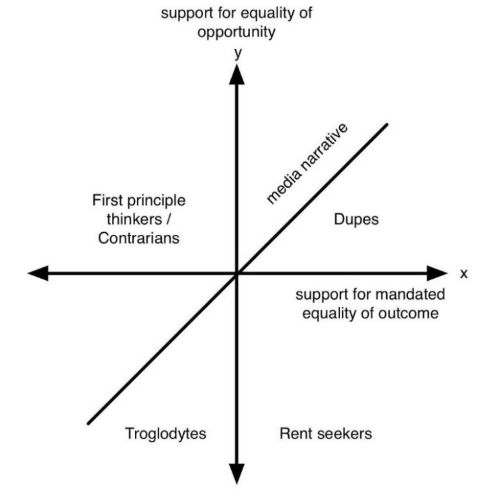The Four Quadrant Model: Difference between revisions
(Created page with "== The Four Quadrant Model == === What Is It?=== In broad terms, the model is a tool for illustrating how the media stigmatizes certain nuanced views that challenge the status...") |
|||
| Line 15: | Line 15: | ||
<br> | <br> | ||
=== Visual Explanation === | === Visual Explanation === | ||
[[File:FQM.jpg|frame|center|The Four Quadrant Model]] | |||
Revision as of 16:30, 6 August 2020
The Four Quadrant Model
What Is It?
In broad terms, the model is a tool for illustrating how the media stigmatizes certain nuanced views that challenge the status quo by portraying people who hold those views as prejudiced or intolerant.
Definitions
1. The “Dupes”: People who believe they can infer someone’s true intentions, beliefs or morality based on their support for, or opposition to, the policy initiative (more on this later).
2. “First principle thinkers” or “contrarians”: They hold nuanced positions that oppose the policy on the x-axis, but support the moral virtue on the y-axis. In the words of Eric Weinstein, “These are people who are thinking for themselves, and are not buying baked-cakes. They’re buying the ingredients and they’re saying, well, I want more of this ingredient, I don’t like that ingredient. So they’re attempting to avoid having any pre-baked idea put in front of them.”
3. “Troglodytes”: Those who oppose the x-axis policy and possess the moral vice represented by the lower-half of the y-axis (e.g. sexists, racists, etc).
4. “Rent seekers”: "Woke" people or companies who have a vested-interest in the x-axis policy because they profit from it, but do not produce much or anything of value in return.

